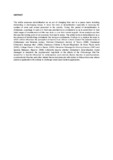Please use this identifier to cite or link to this item:
https://cris.library.msu.ac.zw//handle/11408/1401Full metadata record
| DC Field | Value | Language |
|---|---|---|
| dc.contributor.author | Viriri, Advice | - |
| dc.date.accessioned | 2016-05-19T08:33:01Z | - |
| dc.date.available | 2016-05-19T08:33:01Z | - |
| dc.date.issued | 2010 | - |
| dc.identifier.issn | 0256-6060 | - |
| dc.identifier.uri | http://hdl.handle.net/11408/1401 | - |
| dc.description.abstract | The article assesses demobilisation as an act of changing from war to a peace basis including disbanding or discharging troops. It views the aims of demobilisation especially in reducing the number of arms and armed personnel in the country. During this period of demobilisation in Zimbabwe, a package in cash or in kind was provided to ex-combatants so as to assist them in their initial stages of resettlement but little was done to cure their mental anguish. Some analysts say that this was the turning point of our economy from bad to worse. The article looks at demobilisation as a key process of transforming combatants into being ex-combatants. It will go on to explore the ways in which culture influences the perception of trauma in an African cultural context.The selected body of Zimbabwean war literature namely: Shimmer Chinodya’s Harvest of Thorns (1989), Emmanuel Chiwome’s Masango Mavi (1998), Clemence Chihota & Robert Muponde’s No More Plastic Balls (2000), College Press's A Roof to Repair (2000), Alexander Kanengoni’s Echoing Silences (1997) and Ignatius Mabasa's Mapenzi (1990) sufficiently depicts whether Zimbabwe’s demobilisation model managed to transform the psychosocial magnitude of the effects of the Chimurenga War.The researcher is heavily influenced by contemporary post-colonial, literary theories of psychoanalysis, constructionist theories and other related theoretical protocols with niches in African discourse whose judicious application will continue to challenge newer post-modern approaches. | en_US |
| dc.language.iso | en | en_US |
| dc.publisher | Unisa Press | en_US |
| dc.relation.ispartofseries | Unisa Latin American Report;Vol. 26, No. 1 | - |
| dc.subject | Demobilization | en_US |
| dc.subject | War Trauma | en_US |
| dc.subject | Ex-combatants | en_US |
| dc.subject | Re-Integration | en_US |
| dc.title | Demobilisation, reintegration and Ex-combatants: post war traumas in Zimbabwean war literature | en_US |
| dc.type | Article | en_US |
| item.languageiso639-1 | en | - |
| item.cerifentitytype | Publications | - |
| item.openairetype | Article | - |
| item.grantfulltext | open | - |
| item.fulltext | With Fulltext | - |
| item.openairecristype | http://purl.org/coar/resource_type/c_18cf | - |
| Appears in Collections: | Research Papers | |
Files in This Item:
| File | Description | Size | Format | |
|---|---|---|---|---|
| ABSTRACT Demob.pdf | Abstract | 326.35 kB | Adobe PDF |  View/Open |
Items in MSUIR are protected by copyright, with all rights reserved, unless otherwise indicated.



